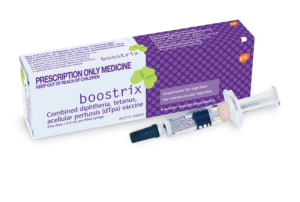 What is Boostrix?
What is Boostrix?
Boostrix vaccine is used to help prevent diphtheria, tetanus, and pertussis in people who are ages 10 to 64 years old. Most people in this age group require only one shot for protection against these diseases.
Boostrix works by exposing you to a small dose of the bacteria or a protein from the bacteria, which causes the body to develop immunity to the disease. Boostrix will not treat an active infection that has already developed in the body.
Like any vaccine, Boostrix may not provide protection from disease in every person.
Important information about Boostrix
In most cases, Boostrix is given in only one dose. Follow your doctor's instructions about receiving a booster dose if needed.
You can still receive Boostrix if you have a cold or fever. In the case of a more severe illness with a fever or any type of infection, wait until you get better before receiving Boostrix.
You should not receive Boostrix a second time if you had a life-threatening allergic reaction after the first shot.
Keep track of any and all side effects you have after receiving Boostrix. If you ever need to receive Boostrix again, you will need to tell your doctor if the first shot caused any side effects.
Becoming infected with diphtheria, pertussis, or tetanus is much more dangerous to your health than receiving the Boostrix vaccine to protect against these diseases. Like any medicine, Boostrix can cause side effects, but the risk of serious side effects is extremely low.
Diphtheria, tetanus, and pertussis are serious diseases caused by bacteria.
Diphtheria causes a thick coating in the nose, throat, and airway. It can lead to breathing problems, paralysis, heart failure, or death.
Pertussis (whooping cough) causes coughing so severe that it interferes with eating, drinking, or breathing. These spells can last for weeks and can lead to pneumonia, seizures (convulsions), brain damage, and death.
Tetanus (lockjaw) causes painful tightening of the muscles, usually all over the body. It can lead to "locking" of the jaw so the victim cannot open the mouth or swallow. Tetanus leads to death in about 1 out of 10 cases.
Diphtheria and pertussis are spread from person to person. Tetanus enters the body through a cut or wound.
Before receiving Boostrix
You should not receive Boostrix if you have ever had a life-threatening reaction to any vaccine containing diphtheria, pertussis, or tetanus, including extreme drowsiness, fainting, or seizures (convulsions).
You may not be able to receive Boostrix if you have ever received a similar vaccine that caused any of the following:
- a very high fever (over 104 degrees);
- a neurologic disorder or disease affecting the brain;
- fainting or going into shock;
- an allergy to latex rubber;
- severe or uncontrolled epilepsy or other seizure disorder; or
- Guillain-Barre' syndrome (within 6 weeks after receiving a vaccine containing tetanus).
Before receiving Boostrix, tell the doctor if you have:
- a history of seizures;
- a neurologic disorder or disease affecting the brain (or if this was a reaction to a previous vaccine);
- a weak immune system caused by disease, bone marrow transplant, or by using certain medicines or receiving cancer treatments; or
- if it has been less than 5 years since you last received a tetanus shot.
You can still receive Boostrix if you have a minor cold. In the case of a more severe illness with a fever or any type of infection, wait until you get better before receiving Boostrix.
FDA pregnancy category C. Boostrix may be harmful to an unborn baby. Tell your doctor if you are pregnant. It is not known whether Boostrix passes into breast milk or if it could harm a nursing baby. Do not use this medication without telling your doctor if you are breast-feeding a baby.
The adult version of this vaccine (Adacel, Boostrix) should not be given to anyone under the age of 10 or over the age of 64. Another vaccine is available for use in children younger than 10 years old.
